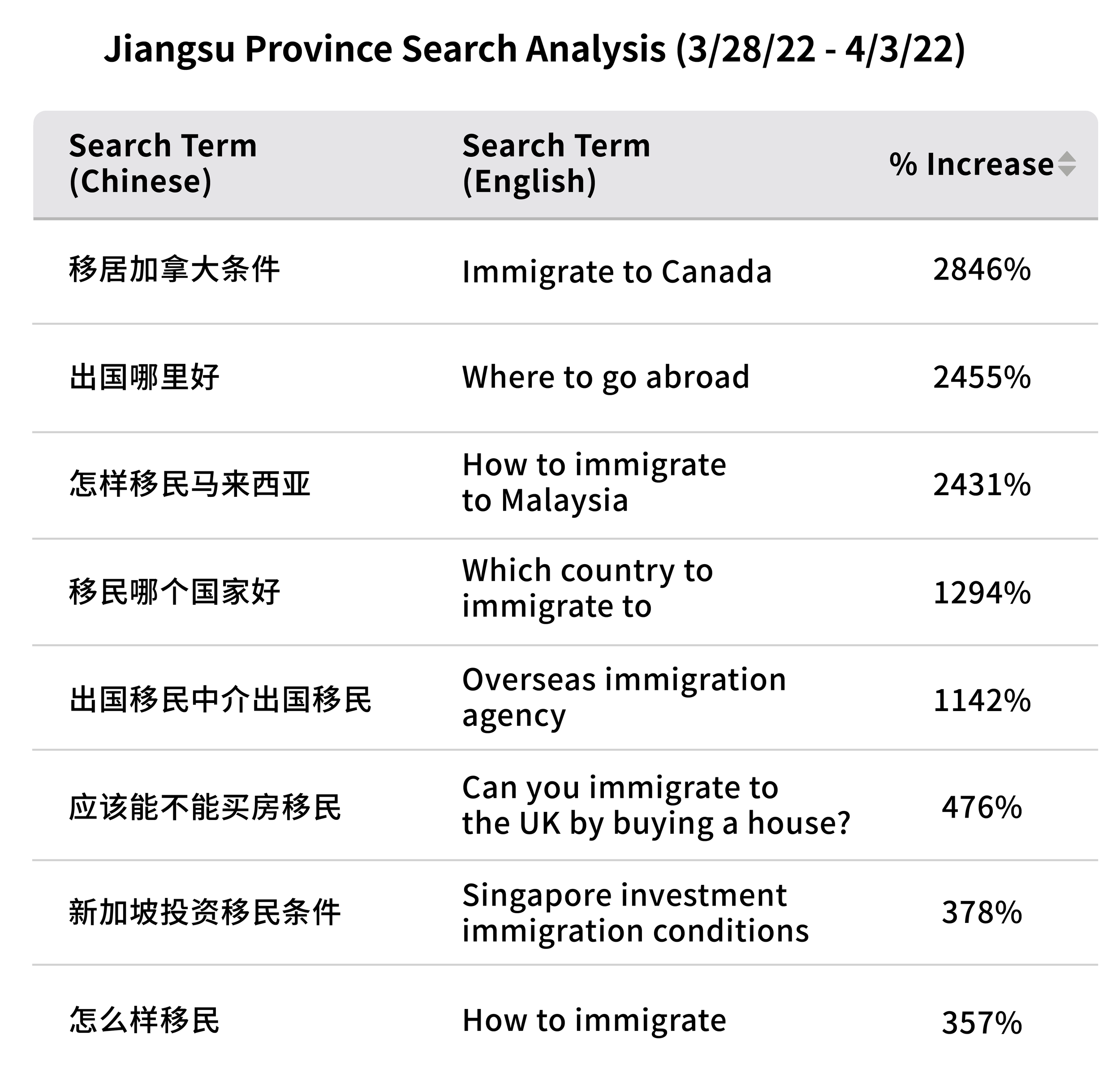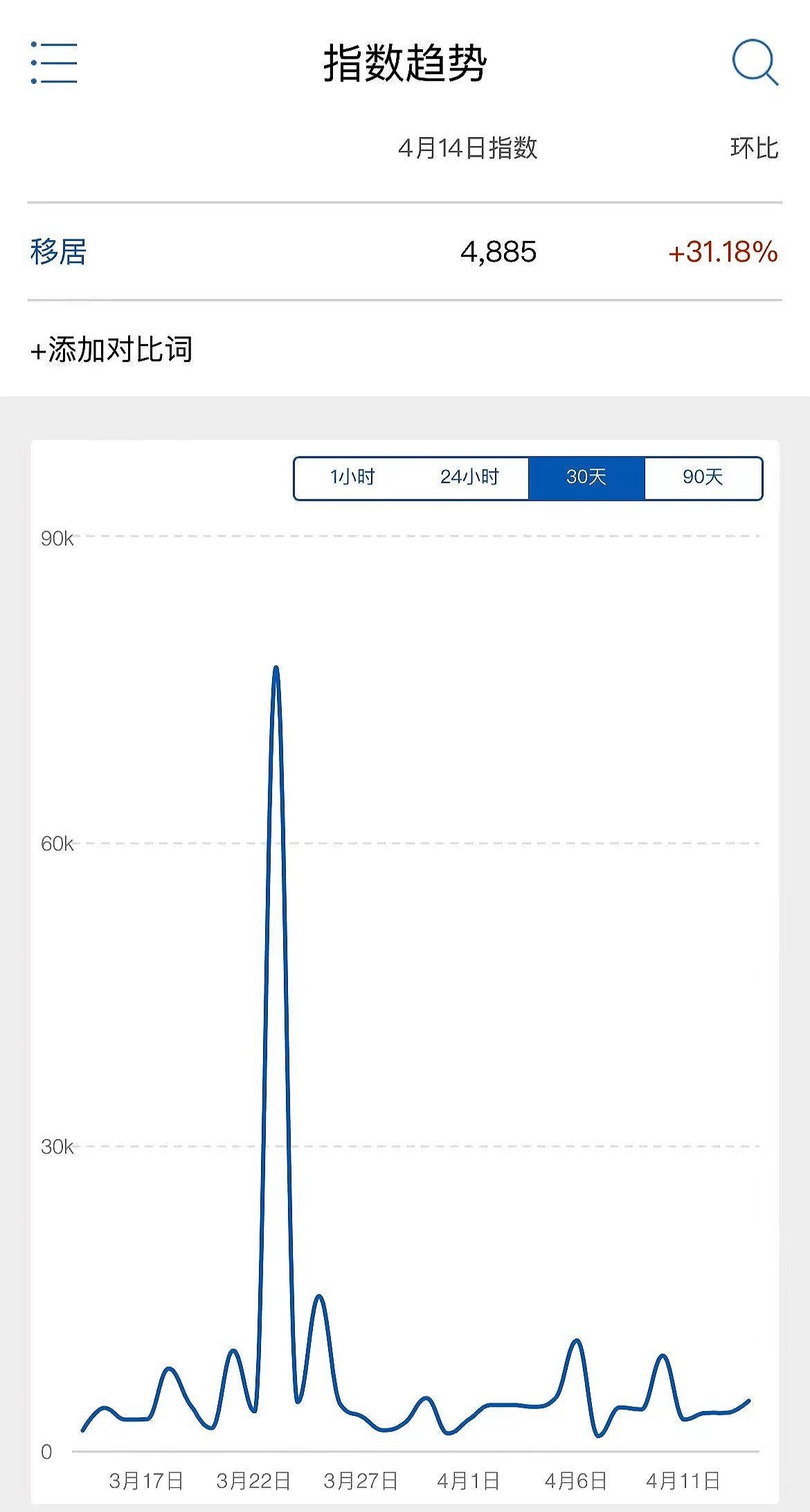Why Are Searches in China for Emigration and Study Abroad Up 440%?
Lockdown Fatigue Is Driving Newfound Interest in Study Overseas and Emigration from China
Strict lockdowns have swept across 45 cities in China. Frustration over logistical mishaps and heavy-handed measures is driving a surge in searches for topics around emigration and study overseas.
Searches for emigration are up as much as 24 times their normal levels on Baidu and 15x normal levels on Weibo. Similar searches on Wechat are up 440%.
There’s reason to believe that this interest will endure after the end of lockdowns, especially among the Chinese upper-middle class.
This presents an interesting window of opportunity for universities to re-engage the Chinese market as families consider charting a future overseas.
Introduction
As much of the world lifts COVID restrictions, residents of more than 45 cities in China are experiencing déjà vu from the early days of the pandemic: strict lockdown orders, empty supermarket aisles, and closed down factories. As of April 14, 2022, Nomura Bank estimated that 373 million people are currently under a full or partial lockdown in China, as part of the government’s “Zero COVID” approach to containing the Omicron variant. As the lockdowns drag on and frustration builds, Chinese search engines and social media platforms have reported a sudden uptick in interest in emigration and study overseas. Far from being a 2020-style nadir for interest in travel overseas, 2022 may propel newfound interest in travel and study overseas, where the discomfort, economic hardship, and mental strain of unpredictable lockdowns seems unlikely. One might ask: what is driving this interest in life overseas? Will this endure in the coming months? And should universities take this seriously as an opportunity to recover lost applications from China using digital marketing in China and Chinese social media marketing?
Lockdown Déjà Vu
Many of Shanghai’s 26 million residents were placed under lockdown on March 28th, and the city remains under lockdown three weeks later, on April 18th. With roads closed and workers at home, production at factories of major car and semiconductor companies has been halted. Early complaints about lost income and uncertainty about the duration of the lockdown have given way to alarm about food shortages, as household stockpiles dwindle and the complexity of delivering food to 26 million people is daunting. Heavy-handed tactics from quarantine enforcement staff have been documented on social media. Residents who have tested positive have been sent to centralized quarantine facilities, sometimes resulting in children being separated from their parents.
While local governments walk a tightrope between preventing economic freefall and flattening the infection curve, the central government and Xi Jinping personally have reaffirmed its commitment to a Zero COVID approach, despite the milder nature of the Omicron variant.
The middle class and the wealthy under lockdown have voiced grievances where they can, be that from their windows or balconies, or from their Wechat and Weibo accounts. Others have begun searching for how to emigrate from China to various countries.
Interest in Immigration and Study Abroad Spike
In a recent analysis of Baidu searches in Jiangsu province, researchers found that search volumes relating to immigration increased by 24 times, but 2,455%. Over a similar time period, immigration searches on Wechat increased by 440%, up to about 50 million searches, on April 3rd as lockdowns swept across more cities.
Source: Baidu Index
Emigration searches on WeChat increased by 440%
Immigration-related Related Searches Spiked on Weibo
Study-abroad Related Searches Spiked on Weibo
Immigration-related related searches also spiked on Weibo, up 15 times their normal levels, with sharp increases happening as particularly stringent lockdowns came into effect in Shenzhen and Jilin in mid and late March. This has translated into study-abroad related searches, which spiked at around the same time on Baidu.
Baidu Searches for ‘Study in the US’ Spiked in April
Will Interest in Life Abroad Subside?
Surely, some of this interest in life abroad is fueled by a form of escapism: a sort of search engine version of binge watching “Tiger King” in the early days of the pandemic, or the spike of searches for emigration after a presidential election. Few Americans picked up and moved because of Trump’s victory in 2016 or Biden’s in 2020. While certainly not everyone who searches for immigration will act on it, there is reason to expect that this boost in interest in immigration will not taper off and disappear.
First, the lockdowns may stay in place for many more days. The lockdowns will eventually lift, but today’s case numbers in some cities have far eclipsed that seen in Wuhan in 2020, where a lockdown lasted for 76 days. The Chinese government has given us no reason to doubt its faith in the Zero COVID approach, and public announcements have left authorities vanishingly little room to charge course. Even with Herculean testing and tracing efforts, the numbers at stake and the need to keep vital factories and ports open may mean a longer lockdown than Wuhan saw in 2020.
COVID-19 Cases in China, 2020 to April 2022. Source: New York Times
Second, the problems faced during the 2022 lockdowns make other countries look more attractive in comparison. Despite early mishandling, China’s ability to virtually eradicate locally-spread COVID in mid-2020 was a source of national pride. China’s approach was heavy-handed and called for many individual sacrifices, but it also showed the benefits of China’s technocratic governance. On the other hand, the lockdowns of 2022 were riddled with poor planning for food and medical distribution, and they counterintuitively called for people to gather in mass testing facilities, despite the risk of infection while waiting for hours to be tested. Sweeping lockdowns seem disproportionate against the much lower public health risks of the milder Omicron variant. If going abroad seemed unpredictable and dangerous in 2020, staying at home in 2022 seems to risk being subject to needless hardship and arbitrary forced isolation. Policies abroad that seemed irresponsible in 2020 now look fair in 2022, and domestic policies that seemed wise in 2020 now look draconian and unpredictable in 2022.
Third, dissatisfaction with lockdowns are some among many recent grievances for the most mobile and savvy members of the middle and wealthy classes in China. Over the past year, government interventions have hobbled the growth of many of China’s most successful companies. It canceled the world’s biggest IPO and limited access to capital for many tech companies. It walloped the edtech, private education, and gaming industries. Entrepreneurs in fintech, e-commerce, live streaming, and even sports players face more regulatory constraints and uncertainty than ever before. Government policy has greatly eroded the fortunes of many whose wealth was tied up in property and stock markets. And it has narrowed meaningful international educational opportunities for the country’s primary and middle schoolers. A prominent Chinese entrepreneur was quoted in TechCrunch as saying, “We entrepreneurs shouldn’t be expected to be political scientists. We should be left alone to focus on building the product.”
Of course, this is not to say that China is facing significant social unrest or a mass exodus of the wealthy. But for some of China’s entrepreneurs, upper-middle class, and wealthy people, life abroad, and study overseas for their children, has a new attraction, and as the days in lockdown turn into weeks, they’ve had all the time in the world to take stock.
What Should Universities Do?
First and foremost, talk to your partners and friends in the cities under the strictest lockdowns like Shanghai and Jilin. They’re going through a particularly tough time, and they’ll appreciate knowing that you’re thinking about them as they navigate a trying time. Ask if there’s anything you can do to help them or the more vulnerable members of their community.
Second, pivot back to virtual recruitment methods for Chinese students under lockdown, bringing everything that you learned since 2020 to bear to make your virtual info sessions interesting and useful. Advocate vociferously to keep your travel budgets earmarked for when physical events return, and reallocate some resources to digital marketing on Chinese search and social media platforms. The students and parents will certainly be online at the moment.
Third, keep an eye on the figures that matter for lockdowns and study overseas: Chinese applications to study in the US had much more to do with travel barriers, visa appointments at US consulates, and students’ preference for offline classes over online learning. That Chinese cities are in lockdown does not necessitate that fewer students will apply, and the opposite may be true this time around. However, it is critical to keep an eye on which US consulates remain open. The US embassy in Beijing is stepping in to service those unable to apply in Shanghai, but the situation is worth monitoring together with your ISSS team.
Fourth, share stories in China about the happy moments on your campus: friend groups reuniting, classes happening offline, and the moments of spontaneous discovery at offline club or career fairs. Show that your campus has balanced the needs of public health with the necessity of creating community and meaningful learning opportunities.






